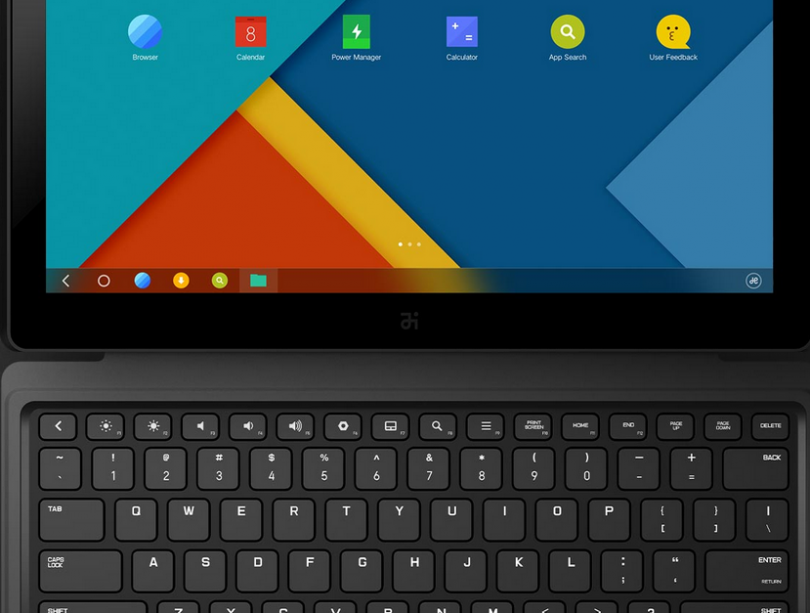aNewDomain – Tech giants grabbed the spotlight early, but all week long their smaller counterparts also shined bright at CES 2015. To give just five examples, announcements by these smaller fries included a new Android tablet, a gadget for storing your own DNA, a GPS system for tracking both people and possessions, a thermal imaging gizmo for the home and a smartphone app rewarding “social responsibility.”
Early on, CES Press Day (Monday of the show) featured 26 on-site press events alone, with big players like Samsung, Sony and LG each issuing multiple announcements, mainly in traditional CES product categories. Most of the startups, on the other hand, waited until Tuesday or beyond to reveal their innovations.
What? You’ve never heard of ventures like Jide, GENiSYSS, Trackimo, Hema Imaging or My Open Road (MOR)?
Well, you’re in luck now, because I’ve rounded up what they unleashed at CES 2015, below.
Jide’s Remix Ultra Tablet
With the Remix Ultra Tablet, Jide — a startup spawned by three ex-Google employees –introduced what appears to be an Android-based answer to the Microsoft Surface Tablet.
Launched at a CES press conference on Wednesday, the Remix offers amenities such as an 11.6-inch 1080p IPS display, a magnetically connected keyboard and a kickstand extensible to 40 and 60 degrees.
Other niceties include an NVIDIA 4+1 processor, stereo speakers, 5 MP rear- and front-facing cameras, 2 GB of RAM, a headphone jack, a microUSB port with an OTG adaptor for conversion to a full USB port, up to 64GB of built-in storage and a microSD slot expandable to 128 GB of additional storage.
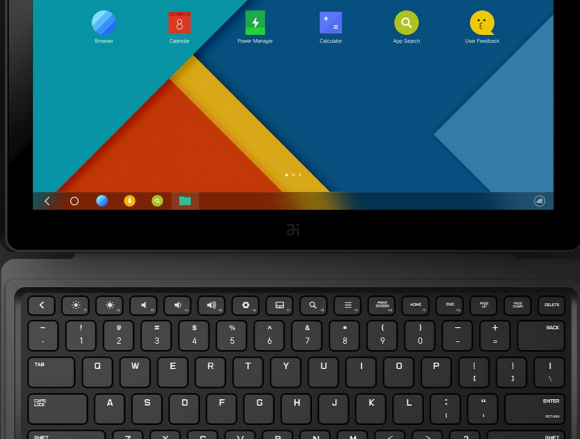
Aside from the Remix, by the way, CES 2015 was relatively sparse on new tablet announcements. For its part, Lenovo brought out the 8-inch Yoga Tablet 2 with “AnyPen” technology, aimed at letting you use any metal object as a stylus.
Also new from Lenovo are two low-cost 7-inch Android 4.4 (KitKat) tablets, both with quad-core processors, Dolby audio and low resolution 1024-by-600 displays. These are the Tab 2 A7-10, priced at $99, and the Tab 2 A7-30, which adds 3G wireless for data connectivity and voice calling for a price of $129.
Toshiba refreshed its Windows-based Encore 2 lineup from last year, while also debuting the Portégé z20t, a Windows-based laptop-tablet hybrid which includes a 12.5-inch screen with 1920-by-1080 resolution, Intel M processors aimed at eliminating the need for cooling fans, a detachable keyboard, up to 8GB of RAM, up to 512 GB of SSD storage and an optional Wacom digitizer for pressure-sensitive pen input.
There were other new convertibles, too, but all in all, tablet presence in 2015 was a far cry from the 80-plus new tablet models rolled out five years ago at CES 2010. In contrast, LG, Lenovo, Asus and ZTE couldn’t wait for the upcoming IFA smartphone showcase this year, instead debuting new phone models at CES 2015. Go figure. But I digress …
DNA Vault from GENiSYSS
At a CES 2015 press conference on Tuesday, a startup called GENiSYSS launched a new hardware item dubbed the DNA Vault.
Alright … so what is that? It’s a thumb-sized gadget combining digital memory with physical wells for storing your DNA at room temperature. Meanwhile, you can use the digital memory for password-protected electronic storage of medical histories, genealogical records and other related text, photo, video and audio content.
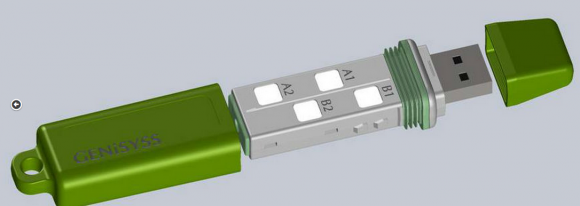
So, how do you go about storing your DNA, and why might you want to do this stuff, anyway? You simply deposit a small drop of blood into the DNA wells in the device. According to GENiSYSS, by storing your DNA over many years, you create a DNA history that doctors might use to diagnose and treat diseases later in your lifetime. Your children might find it helpful, too.
Strange, but it’s there, and fairly innovative.
Trackimo’s Universal Tracker
If you want to track people and things, there are certainly software apps (and other hardware devices) for that. But according to Shai Bar-Levi, CEO and chairman of Trackimo, Inc., the company’s Universal Tracker, introduced on Wednesday, will set “an entirely new price point” for equipment in this space.
Trackimo’s small gadget — measuring 45x18x40 millimeters — will come with accessories that attach to various objects, such as backpacks, belts, bikes and luggage. In the event that your on-the-go friend or child (or your luggage, bike or whatever) travels outside of GPS tracking territory, then you can use cellular tracking instead (wherever cell service is available, that is).
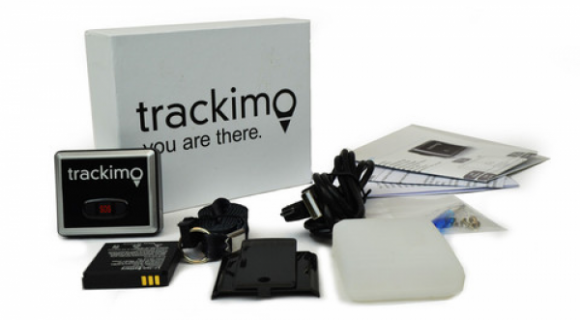
Trackimo currently has an emergency voice channel that will open automatically when an “SOS button” is pressed, enabling remote users to hear what’s happening on the site.
If they care about their privacy, though, people at the “site” might want to watch what they’re saying, don’t you think?
Hema Vision
Hema Imaging’s new HemaImager contraption, announced on Thursday, won’t be for everyone. To be more specific, it’s only good if you own a home and you’re interested in using thermal imaging to diagnose problems like insulation weaknesses, water leakages and electrical service issues.
HemaImager is a handheld “heat mapping” device, which combines an LCD screen with a built-in camera and thermal sensor array.
Video: Hema Imaging — Kickstarter
According to Erik Beall, one of the human forces behind the firm, the gadget is still under development, but once ready, it will cost much less than currently available equipment in this space.
Hema Imaging also considered developing a smartphone app instead but rejected this idea.
Smartphones are all different and many times don’t have enough computing power just when you need it,” contended Beall. “Many of us have experienced our smartphone slowing down over time, apps freezing up and apps failing to work after system updates.”
However, the device can communicate with a smartphones via Wi-Fi. It will also be “user-configurable” for attachments to mounts, tripods, grips and the like.
My Open Road (MOR) Smartphone App
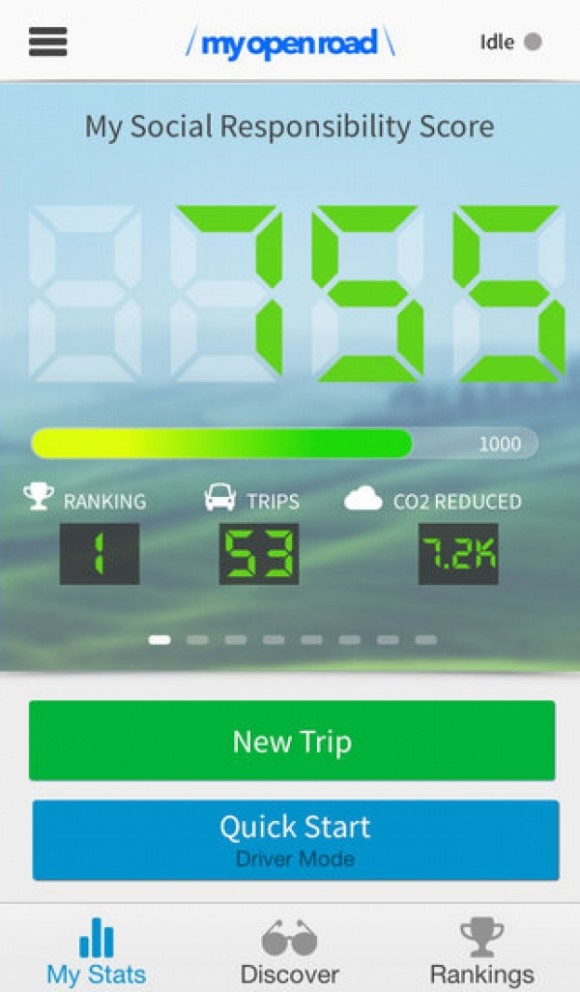 How do you rate on “social responsibility”? The new My Open Road app for Android on Google Play rolled out on Tuesday. It will calculate your score based on how much carbon emission you can save through carpooling, biking and walking, among other environmental positive or negative activities.
How do you rate on “social responsibility”? The new My Open Road app for Android on Google Play rolled out on Tuesday. It will calculate your score based on how much carbon emission you can save through carpooling, biking and walking, among other environmental positive or negative activities.
You can also find out how much money you’ve saved, and you can compare your “performance” on these metrics with that of your friends. You’ll be rewarded on this basis with freebies and discounts at your favorite retailers, according to the app’s inventors.
But the MOR platform might not be for you, either.
The app seems to reward you for not owning a car, a factor that could skew “social responsibility” scores against rural residents. Rather, it’s in favor of those living in cities with decent public transportation.
The small fries at CES 2015 released some fascinating things, even if all their innovation is a bit strange.
For aNewDomain, I’m Jacqueline Emigh.
Image screenshots listed in order: Jide, GENiSYSS, Trackimo, Hema Imaging and My Open Road (MOR)

